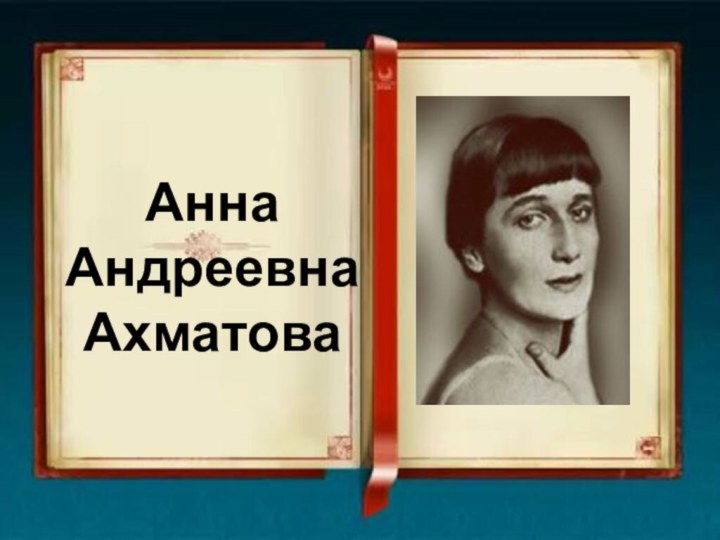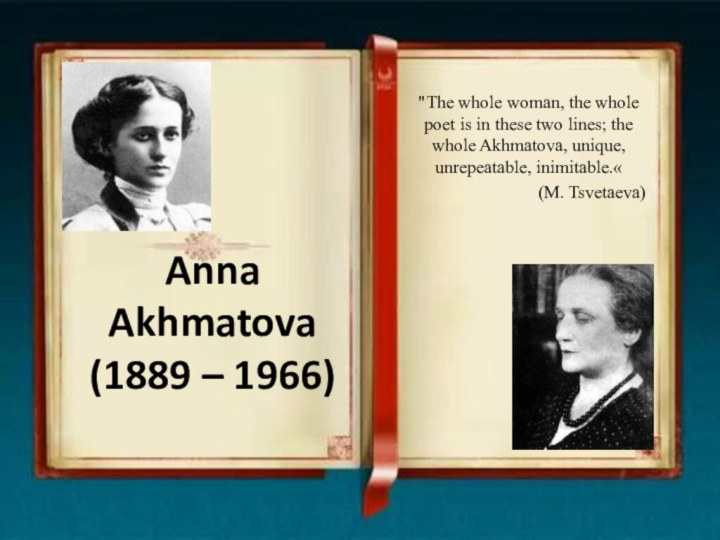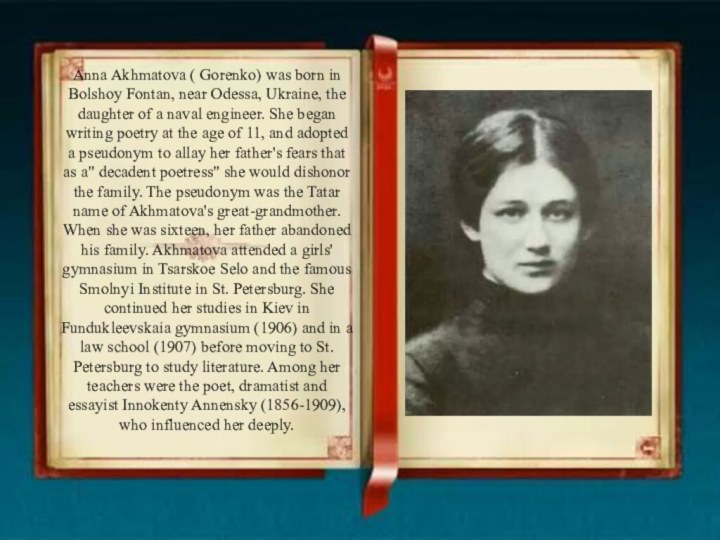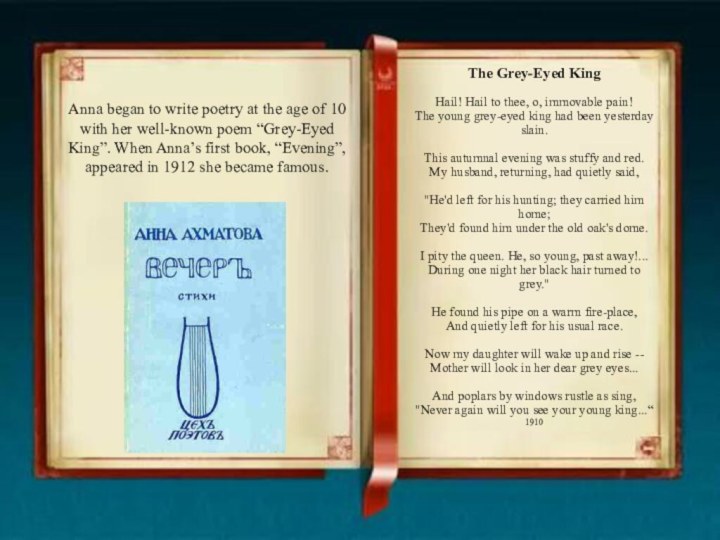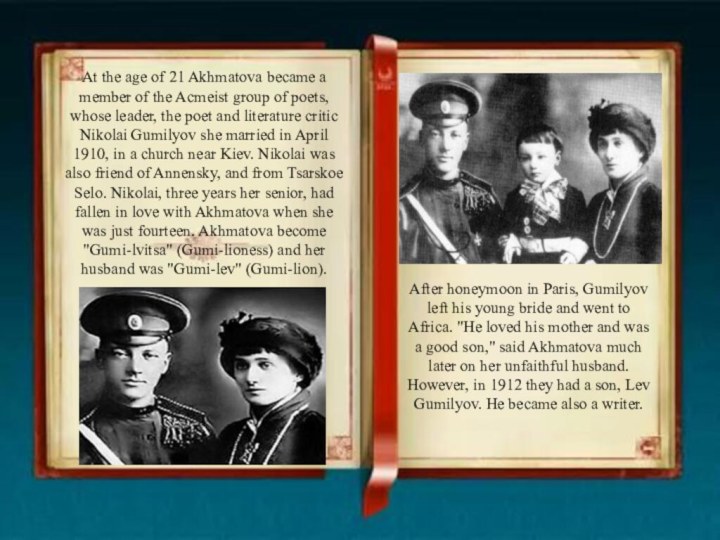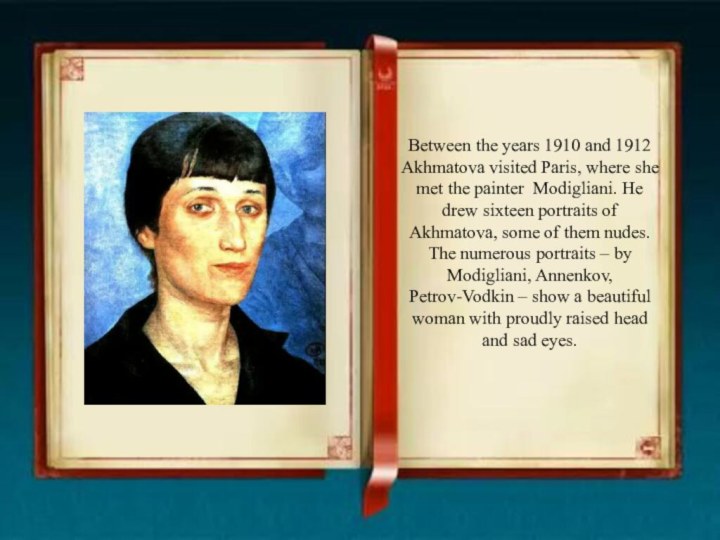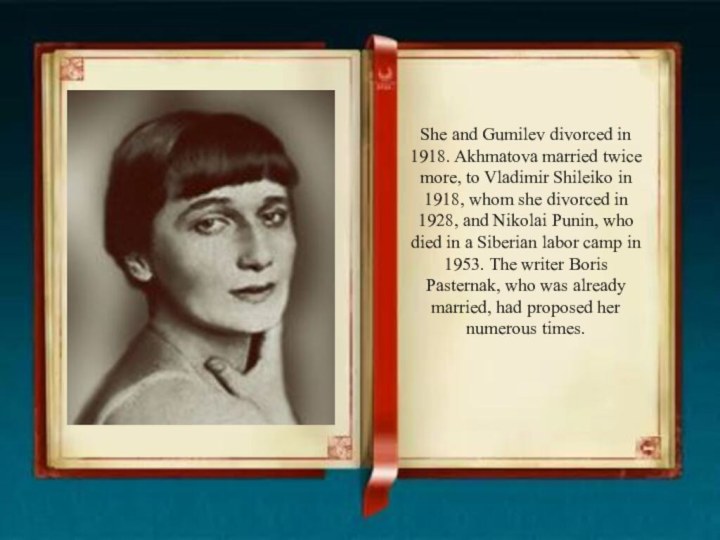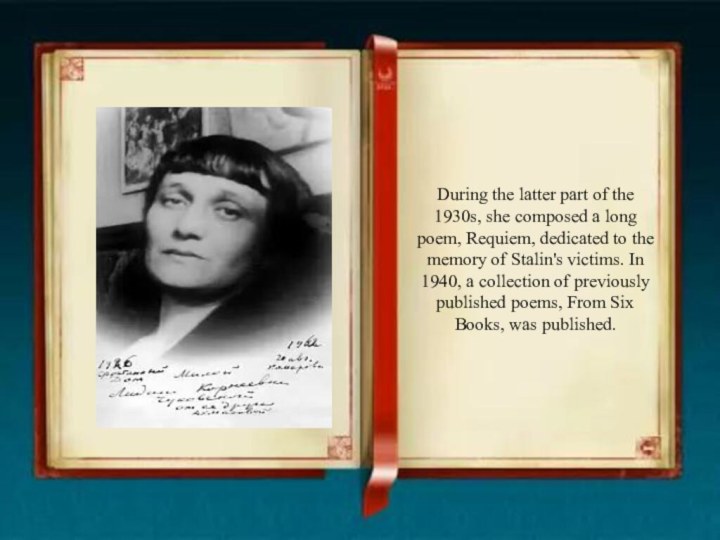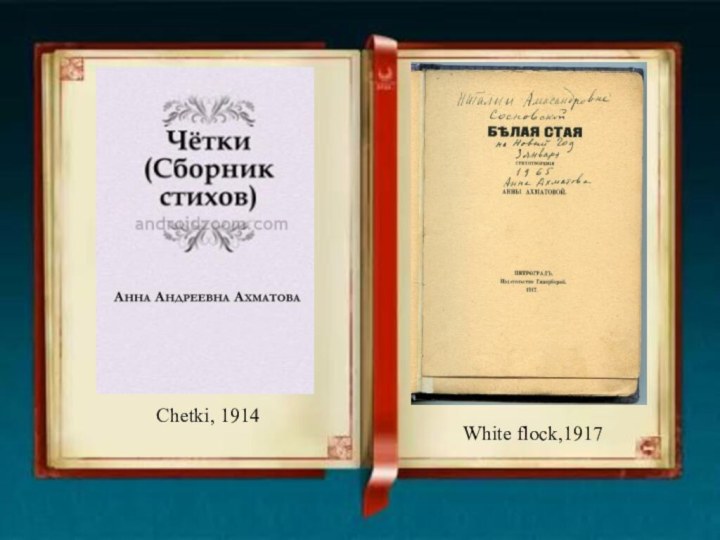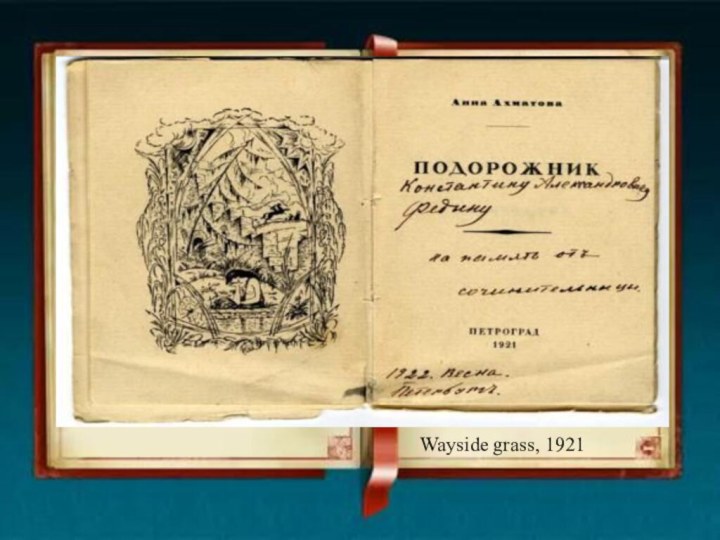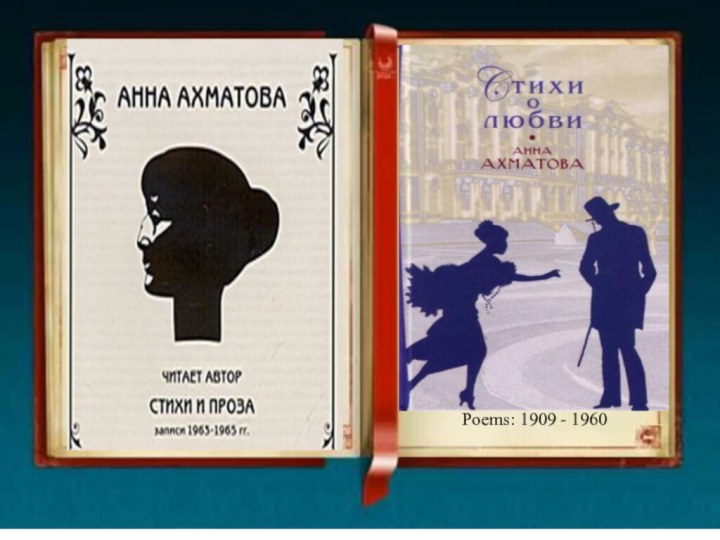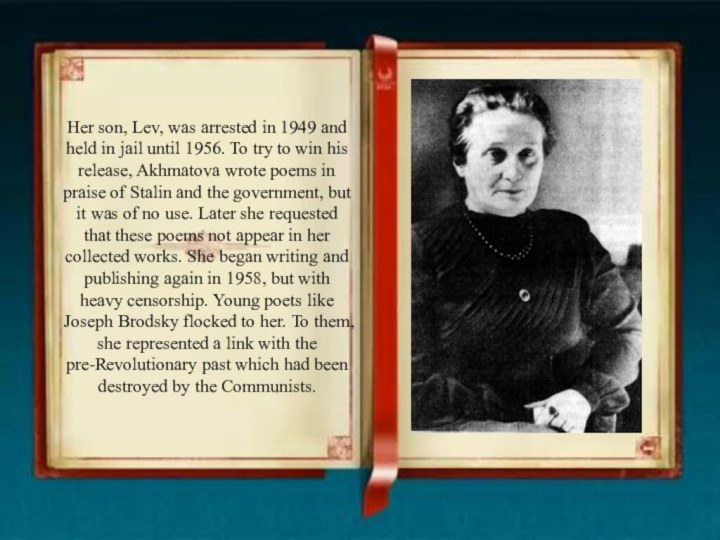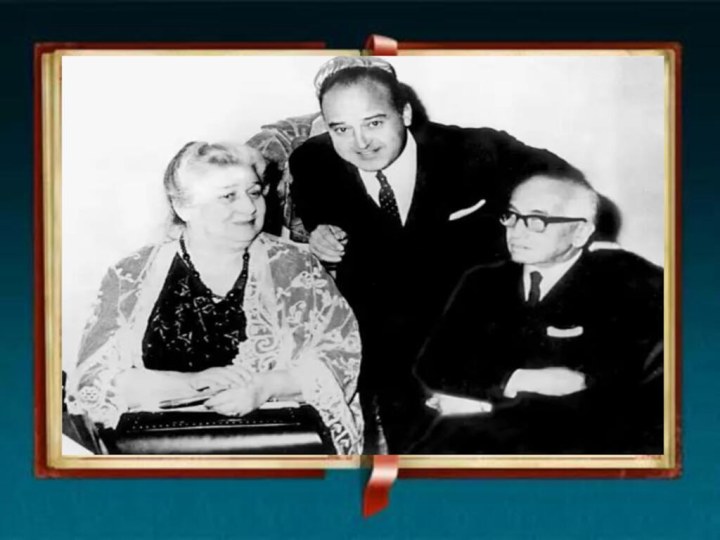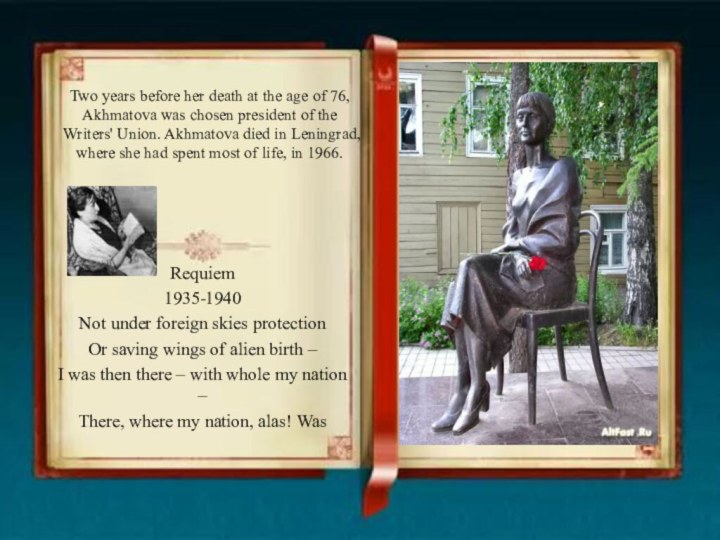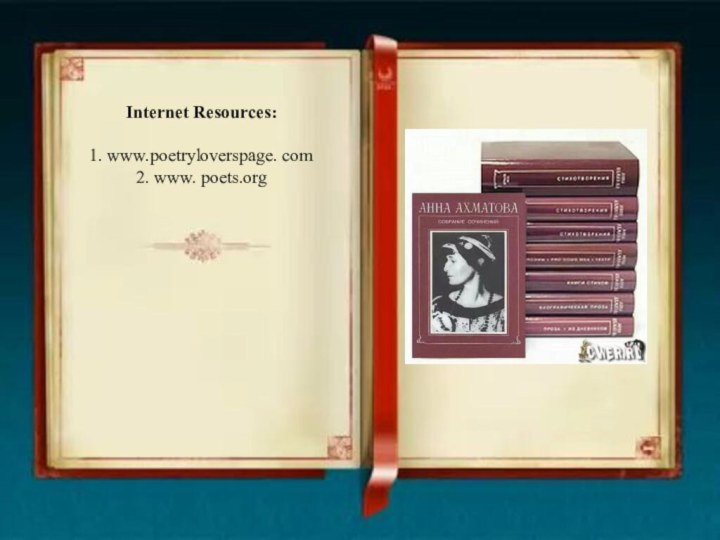Слайд 2
Anna Akhmatova
(1889 – 1966)
"The whole woman, the whole
poet is in these two lines; the whole Akhmatova,
unique, unrepeatable, inimitable.«
(M. Tsvetaeva)
Слайд 3
Anna Akhmatova ( Gorenko) was born in Bolshoy
Fontan, near Odessa, Ukraine, the daughter of a naval
engineer. She began writing poetry at the age of 11, and adopted a pseudonym to allay her father's fears that as a" decadent poetress" she would dishonor the family. The pseudonym was the Tatar name of Akhmatova's great-grandmother. When she was sixteen, her father abandoned his family. Akhmatova attended a girls' gymnasium in Tsarskoe Selo and the famous Smolnyi Institute in St. Petersburg. She continued her studies in Kiev in Fundukleevskaia gymnasium (1906) and in a law school (1907) before moving to St. Petersburg to study literature. Among her teachers were the poet, dramatist and essayist Innokenty Annensky (1856-1909), who influenced her deeply.
Слайд 4
Anna began to write poetry at the age
of 10 with her well-known poem “Grey-Eyed King”. When
Anna’s first book, “Evening”, appeared in 1912 she became famous.
The Grey-Eyed King
Hail! Hail to thee, o, immovable pain!
The young grey-eyed king had been yesterday slain.
This autumnal evening was stuffy and red.
My husband, returning, had quietly said,
"He'd left for his hunting; they carried him home;
They'd found him under the old oak's dome.
I pity the queen. He, so young, past away!...
During one night her black hair turned to grey."
He found his pipe on a warm fire-place,
And quietly left for his usual race.
Now my daughter will wake up and rise --
Mother will look in her dear grey eyes...
And poplars by windows rustle as sing,
"Never again will you see your young king...“
1910
Слайд 5
At the age of 21 Akhmatova became a
member of the Acmeist group of poets, whose leader,
the poet and literature critic Nikolai Gumilyov she married in April 1910, in a church near Kiev. Nikolai was also friend of Annensky, and from Tsarskoe Selo. Nikolai, three years her senior, had fallen in love with Akhmatova when she was just fourteen. Akhmatova become "Gumi-lvitsa" (Gumi-lioness) and her husband was "Gumi-lev" (Gumi-lion).
After honeymoon in Paris, Gumilyov left his young bride and went to Africa. "He loved his mother and was a good son," said Akhmatova much later on her unfaithful husband. However, in 1912 they had a son, Lev Gumilyov. He became also a writer.
Слайд 6
Between the years 1910 and 1912 Akhmatova visited
Paris, where she met the painter Modigliani. He drew
sixteen portraits of Akhmatova, some of them nudes. The numerous portraits – by Modigliani, Annenkov, Petrov-Vodkin – show a beautiful woman with proudly raised head and sad eyes.
Слайд 8
Upon Evening's publication in 1912, Akhmatova became a
cult figure among the intelligentsia and part of the
literary scene in St. Petersburg. Her second book, Rosary (1914), was critically acclaimed and established her reputation. With her husband, she became a leader of Acmeism, a movement which praised the virtues of lucid, carefully-crafted verse and reacted against the vagueness of the Symbolist style which dominated the Russian literary scene of the period.
Слайд 9
She and Gumilev divorced in 1918. Akhmatova married
twice more, to Vladimir Shileiko in 1918, whom she
divorced in 1928, and Nikolai Punin, who died in a Siberian labor camp in 1953. The writer Boris Pasternak, who was already married, had proposed her numerous times.
Слайд 10
Nikolai Gumilev was executed in 1921 by the
Bolsheviks, and, although Akhmatova and he were divorced, she
was still associated with him. As a result, after her book Anno Domini MCMXXI was published in 1922, she had great difficulty finding a publisher. There was an unofficial ban on Akhmatova's poetry from 1925 until 1940. During this time, Akhmatova devoted herself to literary criticism, particularly of Pushkin, and translations.
Слайд 11
During the latter part of the 1930s, she
composed a long poem, Requiem, dedicated to the memory
of Stalin's victims. In 1940, a collection of previously published poems, From Six Books, was published.
Слайд 12
Changes in the political climate finally allowed her
acceptance into the Writer's Union, but following World War
II, there was an official decree banning publication of her poetry and Andrey Zhdanov, the Secretary of the Central Committee, expelled her from the Writer's Union, calling her "half nun, half harlot".
Слайд 13
Though Akhmatova was frequently confronted with official government
opposition to her work during her lifetime, she was
deeply loved and lauded by the Russian people, in part because she did not abandon her country during difficult political times. Her most accomplished works, Requiem (which was not published in its entirety in Russia until 1987) and Poem Without a Hero, are reactions to the horror of the Stalinist Terror, during which time she endured artistic repression as well as tremendous personal loss.
Слайд 17
Her son, Lev, was arrested in 1949 and
held in jail until 1956. To try to win
his release, Akhmatova wrote poems in praise of Stalin and the government, but it was of no use. Later she requested that these poems not appear in her collected works. She began writing and publishing again in 1958, but with heavy censorship. Young poets like Joseph Brodsky flocked to her. To them, she represented a link with the pre-Revolutionary past which had been destroyed by the Communists.
Слайд 19
Akhmatova also translated the works of Victor Hugo,
Rabindranath Tagore, Giacomo Leopardi, and various Armenian and Korean
poets, and she wrote memoirs of Symbolist writer Aleksandr Blok, the artist Amedeo Modigliani, and fellow Acmeist Osip Mandelstam. In 1964 she was awarded the Etna-Taormina prize and an honorary doctorate from Oxford University in 1965. Her journeys to Sicily and England to receive these honors were her first travels outside Russia since 1912.
Слайд 20
Two years before her death at the age
of 76, Akhmatova was chosen president of the Writers'
Union. Akhmatova died in Leningrad, where she had spent most of life, in 1966.
Requiem
1935-1940
Not under foreign skies protection
Or saving wings of alien birth –
I was then there – with whole my nation –
There, where my nation, alas! Was
